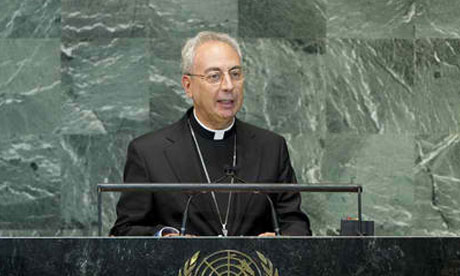The Vatican early this week renewed the Catholic church’s call for global disarmament of nuclear weapons, telling a yearly assembly of world leaders they must reject “the temptation to face new situations with old systems.”
Archbishop Dominique Mamberti, the Vatican’s Secretary for Relations with States, told the conference of the International Atomic Energy Agency that the Vatican “shares the thoughts and sentiments of most men and women of good will who aspire to a total elimination of nuclear weapons.”
Speaking in Vienna to 159 delegates to the IAEA from nations around the world, Mamberti also exhorted nations to look skeptically at the use of any sort of military force, not just nuclear weapons.
“At the difficult crossroads at which humanity finds itself — a crossroads characterized by an increasingly strict interdependence on the economic, political, social and environmental level — one should ask: does the use of force represent a sustainable solution in time?” Mamberti asked.
“It seems, in fact, only to increase mutual distrust and to refer to a distorted sense of priorities that commits significant resources in a short-sighted way,” he continued. “The temptation to face new situations with old systems must be rejected.
“We must redefine the priorities and hierarchies of values by which to mobilize resources towards objectives of moral, cultural and economic development, since development, solidarity and justice are nothing other than the real name for peace, for a lasting peace in time and space.”
The IAEA, which reports to the U.N. General Assembly and Security Council, is an independent agency established in the 1950s to promote so-called peaceful uses of nuclear power.
Quoting from both the current pope, Francis, and Pope John XXIII, Mamberti said frankly that “global security must not rely on nuclear weapons.” Citing at length from John XXIII’s 1963 encyclical letter Pacem in Terris, he said “nuclear weapons must be banned.”
“Even though written 50 years ago, these words seem to reflect the beginning of the 21st century,” Mamberti said. “We should ask ourselves whether we really live in a more secure and safer world today compared with that of a few decades ago.”
Sources
Image: UN Photo
